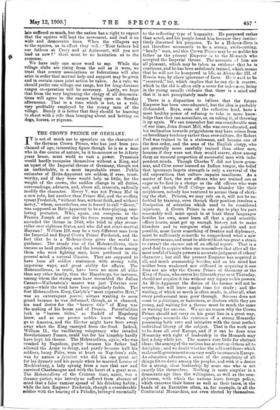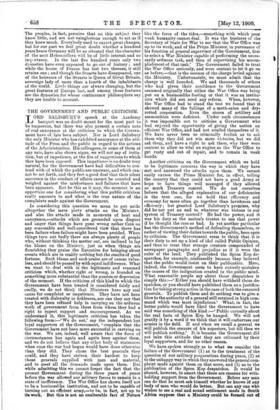THE CROWN PRINCE OF GERMANY.
IT is not of much use to speculate on the character of the German Crown Prince, who has just been pro- claimed of age, interesting figure though he is as a man who in due course of nature, be it to-morrow or be it forty years hence, must wield so vast a power. Prussians would hardly recognise themselves without a King, and an upset of the Imperial throne of Germany, though not an unthinkable, is a most improbable event. Public estimates of Heirs-Apparent are seldom, if ever, trust- worthy, and if they were would help us little, for the weight of the crown, the sudden change in all duties, surroundings, advisers, and, above all, interests, radically modify the character. Henry V. was not Prince Hal in a new robe, but another than Prince Hal, and the scoffing tyrant Frederick, "without fear, without faith, and without mercy," whom, nevertheless, one is forced to call " Great," was supposed as Heir-Apparent to be a flute-playing, ease- loving poetaster. Who, again, can recognise in the Francis Joseph of our day the fierce young tyrant who ascended the throne in 1848, who tried to play steam- roller over eighteen States, and who did not court-martial Hay nau ? William III. may be a very different man from the Imperial and Royal Crown Prince Frederick, and the fact that he is a Hohenzollern gives the world no guidance. The steady rise of the Hohenzollerns, their success as land grabbers, and the heroism of those among them who were fighting men, have produced in the general mind a natural illusion. They are supposed to have been all soldier - statesmen with strong wills, imperious ways, and great ability for affairs. The Hohenzollerns, in truth, have been no more all alike than any other family, than the' Ha.psburgs, for instance, among whom the strong men have resembled the Julian Caesars—Wallenstein's master was just Tiberius over again—while the weak have been singularly feeble. The first Hohenzollern King, Carlyle's " most expensive Herr," was an extravagant poseur, always wanting to seem grand because he was deformed, though, as it chanced, his mad desire for the " barren title " of King was the making of his house and of Prussia. Potentialities lurk in " barren titles," as Rudolf of Hapsburg knew, and as our poorer nobles know when they go to America, and the Elector might have been swept away when the King emerged from the flood. Indeed, William IL, the vacillating voluptuary who invaded Revolutionary France, could but for his kingship hardly have kept his throne. The Hohenzollern, again, who was crushed by Napoleon, partly because his father bad allowed the Army to decay, and partly because half his soldiers, being Poles, were at heart on Napaleon's side, was by nature a faineant who did his one great act for his dynasty and his people when he married Louise of Mecklenburg, a lady sprung from a race that saw and survived Charlemagne and with the heart of a great man. The Hohenzollern of the Crimean time, again, was a dreamy pietist, who latterly so suffered from absence of mind that a false rumour spread of his drinking habits ; while the late Emperor Frederick, though a considerable soldier with the bearing of a Paladin, belonged essentially to the reflecting type of humanity. He purposed rather than acted, and his people loved him because they instinc- tively discerned his purposes. To be a Hohenzollern is not therefore necessarily to be a strong, swift-cutting, "heady" man, and this Crown Prince may be as unlike his father as the present Emperor is to the Monarch who accepted the Imperial throne. The accounts < f him are all pleasant, which may be taken as evidence that he is courteous, and he has been sedulously trained, which means that he will not be hampered in life, as Alexander III. of Russia was, by sheer ignorance of facts. He is said to be "reserved," too, which implies that he can this k reserve, which in the old is often only a cover for indecision, being in the young usually evidence that there is a mind and that it is not precipitately made up.
There is a disposition to believe that the future Emperor has been over-educated, but the idea is probably ill-founded. Boys, even of the reflective kind, have a most healthy power of refusing to take in more know- ledge than they can assimilate, or, on taking it, of throwing it up again. We can remember but one considerable man of our time, John Stuart Mill, who was over-educated, and his inclination towards priggishness may have arisen from an hereditary tendency rather than over-culture. Sir Robert Peel was trained to be a statesman, and became one of the first order, and the sons of the English clergy, who are generally more carefully trained than other men, because if they were not they would starve, show among them an unusual proportion of successful men with inde- pendent minds. Though Charles V. did not know gram- mar, and Clive never learned an Indian tongue, the belief that ignorance begets strength is only a survival of the old superstition that culture impairs manliness. As a matter of fact, the new officers who are trained are as eager to be first in a charge as the old officers who were not, and though Staff College men blunder like their neighbours, nobody has ventured to accuse them of shirk- ing the shot. Princes, we may rely on it, will not be en- feebled by training, even though their position involves a dissipation of attention which used to be considered injurious. A Crown Prince in our day to play his part reasonably well must speak in at least three languages besides his own, must learn all that a good scientific officer learns, must get up enough history not to make blunders and to recognise what is possible and not possible, must know something of treaties and diplomacy, must be sufficiently scientific to comprehend what a new discovery means, and must be able without too great a strain to extract the essence out of an official report. That is a good deal to acquire when one remembers that after all the most useful of kingly powers is accurate judgment of others' character ; but still the present Emperor has acquired it all, and much seamanship besides, and as his mind has neither been weakened nor stiffened in acquiring it one does not see why the Crown Prince of Germany or the King of Spain, who enters his fifteenth year next Thursday, should not acquire it too without any injury to his powers. As Heir-Apparent the duties of the former will not be severe, but will leave ample time for study ; and the waiting, of which so much is often made, is, after all, what every professional man goes• through. Success does not come to politicians, or barristers, or doctors while they are young, and waiting for a throne must be much the same as waiting for success. We seo no reason why the Crown Prince should not carry on his great line in a great way, —perhaps reconcile the existence of a strong Monarchy possessing both veto and initiative with the most perfect individual liberty of the subject. That is the work now to be done all over Europe, and if it can be done true Monarchy with right of leadership in the Monarch may last a long while yet. The masses care little for abstract ideas ; the arming of the nations has accustomed them all to discipline ; and we doubt whether the self-Confidence which makes self-government seem easy really increases in Europe. As education advances, a sense of the complexity of all things filters down among the peoples, and with it a desire for a strong, clear leadership by some one who is not exactly like themselves. Nothing is more singular in a democratic age than the willingness, as well as the com- pleteness, with which the nations leave foreign policy, which concerns their bones as well as their taxes, in the hands of an Executive often, as, for example, in all the Continental Monarchies, not even elected by themselves. The peoples, in fact, perceive that on this subject they know little, and are not vainglorious 'enough to act as if they knew much. Everybody used to expect great changes, but for our part we feel great doubt whether a hundred years hence Germany will be so situated that the character of the next Hohenzollern will be of little interest and no imprtance. In the last five hundred years only two dynasties have even appeared to go out of history ; and while the house of France has lost two thrones, it still retains one ; and though the Stuarts have disappeared, one of the heiresses of the Stuarts is Queen of Great Britain, sovereign lady of more than a fourth of the inhabitants of the world. Little things are always changing, but the great features of Europe last, and among those features are the dynasties for whose continuance philosophers say they are unable to account.







































 Previous page
Previous page